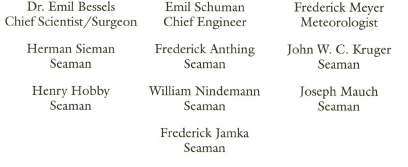Fatal North
Authors: Bruce Henderson


Fatal North
OTHER BOOKS BY BRUCE HENDERSON
LEAP OF FAITH:
An Astronaut's Journey into the Unknown (with Gordon Cooper)
TRACE EVIDENCE:
The Hunt For An Elusive Serial Killer
AND THE SEA WILL TELL:
Murder on a South Seas Island (with Vincent Bugliosi)
TAKING BACK OUR STREETS:
Fighting Crime in America (with Willie L. Williams)
ERNEST & JULIO: OUR STORY
(with Ernest and Julio Gallo)
EMPIRE OF DECEIT:
Inside the Biggest Sports and Bank Scandal in U.S. History
(with Dean Allison)
Â
Fatal North

Adventure and Survival Aboard
USS Polaris, the First U.S. Expedition
to the North Pole
Diversion Books
A Division of Diversion Publishing Corp.
80 Fifth Avenue, Suite 1101
New York, New York 10011
www.DiversionBooks.com
Copyright © 2011 by Bruce Henderson
All rights reserved, including the right to reproduce this book or portions thereof in any form whatsoever.
For more information, email [email protected].
First Diversion Books edition September 2011.
ISBN: 978-0-9838395-9-0 (ebook)
1 3 5 7 9 10 8 6 4 2
6.  “How Do You Spell Murder?”
8.  Stirring an Ice-Cold Grave
Break, break, break
On these cold ice blocks, O seal
And I would that my tongue could utter
The thoughts that arise in me.
âAlfred, Lord Tennyson

The Members of the North Polar Expedition
Aboard USS
Polaris
T
HE
A
MERICANS

T
HE
G
ERMANS

O
THER
I
MMIGRANTS

T
HE
E
SKIMOS

A
UGUST
1968
N
ORTHWESTERN GREENLAND
F
our men packing shovels, picks, and other digging tools walked across the Arctic tundra toward a lone grave.
The adventurers included a prominent internist from Massachusetts, an English professor from Dartmouth, a veteran out-doorsman, and an ex-Marine recently back from a combat tour in Vietnam. Flying in from Resolute Bay in Canada's Northern Territories the previous afternoon, they had been dropped off by a high-wing, seven-passenger Single Otter flown by an experienced bush pilot. In a hurry to fulfill other flying commitments, the pilot had taken off as soon as the men and their gear were unloaded, with the promise to be back in two weeks to return them to civilization.
The small party had been deposited on the vast, treeless plain known, since its discovery the previous century, as Polaris Promontory. It extended for some forty miles, and before the visitors left, they agreed that the expanse was disturbing in its lifelessness. Surrounded in the distance by a fringe of low hillsâ
some smooth, others jagged with cliffs, all equally barrenâthe terrain was empty and altogether inhospitable as far as the eye could see. There was no snow on the ground, and chunks of ice, some quite large, were floating in the nearby sound, christened Thank God Harbor long ago by its grateful discoverer. The passing icebergs helped maintain a perennial chill in the air.
Under the clear blue skies and surprising brightness of the unsetting Arctic summer sun, their first order of business was to establish camp. They knew the weather in this high latitude could turn suddenly, and they didn't want to be caught in the open without shelter. They set up their tents, secured the gear, prepared a spartan meal on a camp stove, and, with great excitement of what the next day might bring, settled down for the night in their thermal sleeping bags.
The morning after arriving at one of the most isolated spots on Earth, they crossed the stony flats toward the old grave and the grim task that had brought them here: to conduct an autopsy on the remains of its longtime occupant. The weather had changed during the night. The sky was covered with a low, dull overcast, suitably bleak, the men agreed, for the task at hand.
Spotting the grave was easy enough. The only manmade object in the desolate landscape, it was marked by a stone cairn in the shape of a burial mound, an old wooden headboard and, mounted atop two thick wooden beams, an impressive brass tablet, preserved by the dry air and burnished by the winds, with this inscription:
SACRED TO THE MEMORY OF
CAPTAIN C. F. HALL
OF THE U.S. SHIP POLARIS,
WHO SACRIFICED HIS LIFE IN THE ADVANCEMENT OF SCIENCE
ON NOVr 8th 1871
THIS TABLET HAS BEEN ERECTED
BY THE BRITISH POLAR EXPEDITION OF 1875
WHO FOLLOWING IN HIS FOOTSTEPS HAVE PROFITED BY HIS
EXPERIENCE
Dartmouth professor Chauncey Loomis, a lean six-footer in his late thirties with an unruly shock of black hair that fell over his forehead, knew that the British North Polar Expedition had brought the brass tablet from London in anticipation of passing the grave. From his research, Loomis had learned that not long after the ensuing ceremony at the graveâcomplete with the hoisting of an American flagâthe British expedition came limping back, defeated by the most unwelcoming weather on the planet, having fallen short of its goal of reaching the North Pole and with two of its own, victims of scurvy, dead and buried in Arctic tundra.
The grave, which came to serve not as a warning beacon but as a beckoning signal to those who followed, had since been visited by other hardy souls. Those paying homage included, in 1881, the Greely Expedition; twenty-five American soldiers under the command of Augustus Greely, another failed Arctic effort, which cost the lives of nineteen and ended with the survivors telling tales of starvation, mutiny, shipwreck, execution, and cannibalism. American explorer Robert E. Peary passed several times aboard his support vessel, USS
Roosevelt,
between 1898 and 1909.